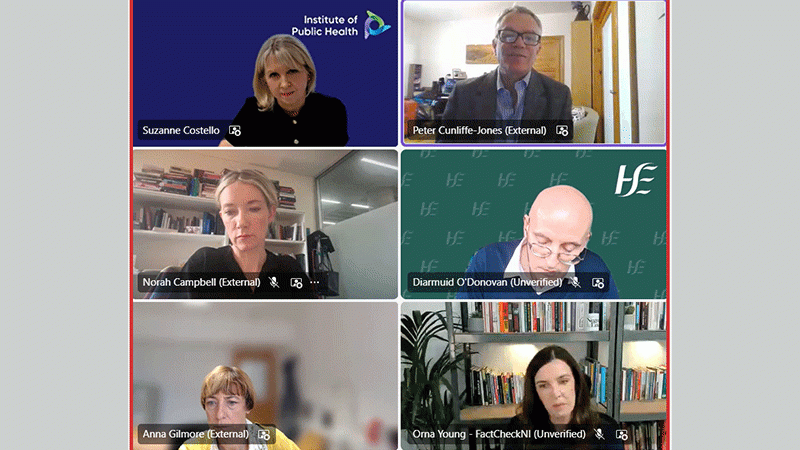Peter Cunliffe-Jones, Visiting Researcher at the University of Westminster, recently attended the Joint North South Public Health Conference to speak about health misinformation. This online event gathered more than 1,000 health professionals and researchers from across Ireland, Northern Ireland and beyond to address the commercial and political factors of health and the rise in misinformation and disinformation in the public health sector.

Held on 18 September, the conference was organised by the Institute of Public Health, the Public Health Agency, the Department of Health in Northern Ireland and Ireland, as well as several universities across the region. Titled Turning the Tide: Tackling the Commercial and Political Determinants of Health Through Policy and Practice, the conference explored how public health and health professionals, academics, policymakers and researchers can respond to the challenges posed by commercial and political factors that shape health and wellbeing. These include the aggressive marketing and promotion of unhealthy products, corporate lobbying and the influence of political systems and policies on people’s health and wellbeing.
The online conference was opened by the Minister for Health in Northern Ireland, Mike Nesbitt MLA, and the Minister of State with responsibility for Public Health, Wellbeing and the National Drugs Strategy in Ireland, Jennifer Murnane O’Connor TD.
Among several talks by delegates, Peter Cunliffe-Jones addressed how health misinformation today comes in many forms, from promoting ineffective or dangerous treatments for serious conditions to spreading false ideas about disease causes and susceptibility. He highlighted how history shows that misinformation can have catastrophic effects on public health when it influences policymakers, with evidence of this happening today in both the United States and among some UK political parties. He explained that while there is significant research into the impact of specific false claims, such as those concerning vaccines, there is a lack of comprehensive data on the spread of harmful misinformation overall.
Finally, he argued that tackling misinformation requires a many-sided response such as improving health and media literacy, providing accurate health information tailored for vulnerable communities, supporting fact-checking initiatives to counter false claims and challenging long-term anti-science narratives through storytelling that resonates with wider audiences.
His talk offered insights that he explores in his recent book Fake News- What's the harm? which was published in June and sets out four ideas for fact-checkers, policymakers and platforms to curb harmful consequences and protect wider freedom of speech.
About the conference, Cunliffe-Jones said: “This conference was a great opportunity to explore and discuss how the food industry’s influence on policy and the rise of health misinformation on social media is harming public health across Ireland and other countries. While there has been considerable research of harm done by particular false claims, such as those around certain vaccines, we don't have the good data, both comprehensive and granular, on misinformation's effects on public health in Ireland or other countries. I am grateful to the organisers for the chance to explain how my own work, in partnership with colleagues, can provide policymakers and researchers with just this sort of evidence.”
His talk at the conference directly contributes to the United Nations Sustainable Development Goals (SDG) 3: Good Health and Well-being and 16: Peace, Justice and Strong Institutions. Since 2019, the University of Westminster has used the SDGs holistically to frame strategic decisions to help students and colleagues fulfil their potential and contribute to a more sustainable, equitable and healthier society.
Learn more about Media and Communication courses at the University of Westminster.


